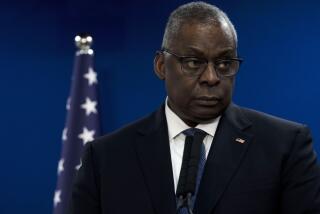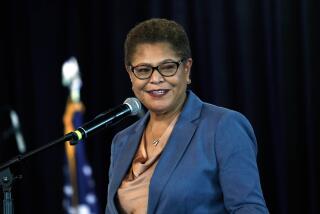Family Receives Word From Deported Man
Three weeks after he was deported to Pakistan, a longtime California resident questioned for possible links to terrorism has been heard from by his family, telling them he is being detained in a military hospital.
The wife and older brother of Nasir Ali Mubarak, 35, said he telephoned them from the hospital in an undisclosed Pakistan location late last week for the first time since he was escorted to Pakistan by two INS agents. They said Mubarak told them he was being held at the request of the U.S. government--a claim denied by FBI and INS officials.
“I am relieved to hear from him. I am relieved to hear he is OK,” Mubarak’s American-born wife, Stephanie, said. “But it worries me that we are in the same boat ... that he is still in custody.”
On Aug. 29, Mubarak, who had not lived in Pakistan since he was 3 years old, was voluntarily deported for violating his student visa.
The action followed numerous interviews with FBI and INS agents since the Sept. 11 terrorist attacks investigating Mubarak’s time in the U.S. and particularly his relationship with convicted terrorist Abdul Hakim Murad. A Pakistani national, Mubarak arrived in the U.S. with Murad in 1991, and the two attended several flight schools together. In 1996, Murad was sentenced to life in prison for plotting to blow up a dozen jetliners over the Pacific Ocean.
Before and after Mubarak’s deportation, his family and friends maintained that he had no ties to terrorism and had had no contact with Murad for years, and didn’t even know about Murad’s arrest until 1999.
After Mubarak arrived in Pakistan on Aug. 30, his whereabouts remained a mystery to family and friends until his telephone calls beginning late last week. They said he told them he had borrowed a cell phone from someone in the hospital to make the calls.
Mubarak told them he had been hospitalized for recurring injuries resulting from a botched hernia operation years ago, Stephanie Mubarak said Monday by phone from Corning, Calif., just outside Chico, where her husband ran an aircraft painting business.
Before being taken to the hospital last week, according to his wife, Mubarak said he had been detained at a military facility for questioning that began as soon as he arrived at the airport in Islamabad.
“He told me he asked them why he was being held,” Stephanie Mubarak said. “And he said he was told the U.S. government wanted to detain him because he was under suspicion.... Later, he said he was told it was the FBI” that requested that action.
Mubarak’s brother, Shafqat, who also lives in California, said he was told by Mubarak that the detention was requested by the U.S. officials who handed him over to Pakistan.
An INS spokeswoman declined to comment Monday. But in a Sept. 10 letter to Mubarak’s attorneys, a lawyer for the INS said no one from the agency asked for Mubarak to be detained in Pakistan.
That letter described Mubarak’s arrival with the two INS agents, where they were approached by plainclothes “persons who our officers believe were officials of the Pakistani government.” Mubarak was eventually taken away in a jeep and not seen again by the INS officers, the letter said.
Michael Mason, who heads the FBI’s Sacramento office, said Monday that it was “categorically” untrue that his office asked Pakistani officials to detain Mubarak. “So if he is being held--and I am sure he is--it must be over something of interest to the Pakistanis,” Mason said.
A spokesman for the Pakistani embassy in Washington, D.C., said he had no details about the nature of Mubarak’s detention.
While acknowledging that U.S. authorities never charged Mubarak with anything other than an immigration violation, Mason said Monday that that did not mean there are no suspicions that Mubarak knew more than he told authorities.
“I am not satisfied that he had nothing to do with terrorism,” Mason said. “Quite the contrary, all the information I have suggests
That notion was rejected by Mubarak’s supporters.
“He has been cooperative with the FBI since day one,” said his co-counsel Ilyce Shugall.
“He openly talked to them on Sept. 11. He agreed to a polygraph. He agreed to further interviews later,” the San Francisco attorney said. “And clearly, after all that, there was not sufficient evidence to charge him with any crime or they would have done so.”
More to Read
Sign up for Essential California
The most important California stories and recommendations in your inbox every morning.
You may occasionally receive promotional content from the Los Angeles Times.










